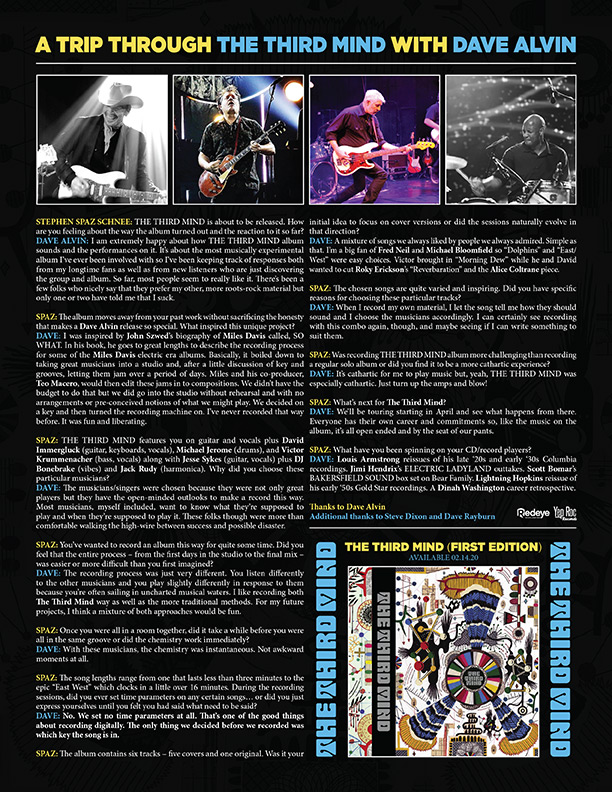STEPHEN SPAZ SCHNEE: THE THIRD MIND is about to be
released. How are you feeling about the way the album turned out and the
reaction to it so far?
DAVE ALVIN: I am extremely happy about how THE THIRD MIND album
sounds and the performances on it. It’s about the most musically experimental
album I’ve ever been involved with so I’ve been keeping track of responses both
from my longtime fans as well as from new listeners who are just discovering
the group and album. So far, most people seem to really like it. There’s been a
few folks who nicely say that they prefer my other, more roots-rock material
but only one or two have told me that I suck.
SPAZ: The album moves away from your past work without sacrificing
the honesty that makes a Dave Alvin release so special. What inspired this
unique project?
DAVE: I was inspired by John
Szwed’s biography of Miles Davis
called, SO WHAT. In his book, he goes to great lengths to describe the
recording process for some of the Miles Davis electric era albums. Basically, it
boiled down to taking great musicians into a studio and, after a little
discussion of key and grooves, letting them jam over a period of days. Miles
and his co-producer, Teo Macero,
would then edit these jams in to compositions. We didn’t have the budget to do
that but we did go into the studio without rehearsal and with no arrangements
or pre-conceived notions of what we might play. We decided on a key and then
turned the recording machine on. I’ve never recorded that way before. It was
fun and liberating.
SPAZ: THE THIRD MIND features you on guitar and vocals plus David Immergluck (guitar, keyboards,
vocals), Michael Jerome (drums), and
Victor Krummenacher (bass, vocals)
along with Jesse Sykes (guitar,
vocals) plus DJ Bonebrake (vibes)
and Jack Rudy (harmonica). Why did
you choose these particular musicians?
DAVE: The musicians/singers were chosen because they were not only
great players but they have the open-minded outlooks to make a record this way.
Most musicians, myself included, want to know what they’re supposed to play and
when they’re supposed to play it. These folks though were more than comfortable
walking the high-wire between success and possible disaster.
SPAZ: You’ve wanted to record an album this way for quite some
time. Did you feel that the entire process – from the first days in the studio
to the final mix – was easier or more difficult than you first imagined?
DAVE: The recording process
was just very different. You listen differently to the other musicians and you
play slightly differently in response to them because you’re often sailing in
uncharted musical waters. I like recording both The Third Mind way as
well as the more traditional methods. For my future projects, I think a mixture
of both approaches would be fun.
SPAZ: Once you were all in a room together, did it take a while
before you were all in the same groove or did the chemistry work immediately?
DAVE: With these musicians, the chemistry was instantaneous. Not
awkward moments at all.
SPAZ: The song lengths range from one that lasts less than three
minutes to the epic “East West” which clocks in a little over 16 minutes.
During the recording sessions, did you ever set time parameters on any certain
songs… or did you just express yourselves until you felt you had said what need
to be said?
DAVE: No. We set no time parameters at all. That’s one of the good
things about recording digitally. The only thing we decided before we recorded
was which key the song is in.
SPAZ: The album contains six tracks – five covers and one original.
Was it your initial idea to focus on cover versions or did the sessions
naturally evolve in that direction?
DAVE: A mixture of songs we always liked by people we always
admired. Simple as that. I’m a big fan of Fred
Neil and Michael Bloomfield so “Dolphins”
and “East/West” were easy choices. Victor brought in “Morning Dew” while he and
David wanted to cut Roky Erickson’s “Reverbaration”
and the Alice Coltrane piece.
SPAZ: The chosen songs are quite varied and inspiring. Did you have
specific reasons for choosing these particular tracks?
DAVE: When I record my own material, I let the song tell me how
they should sound and I choose the musicians accordingly. I can certainly see
recording with this combo again, though, and maybe seeing if I can write
something to suit them.
SPAZ: Was recording THE THIRD MIND album more
challenging than recording a regular solo album or did you find it to be a more
cathartic experience?
DAVE: It’s cathartic for me to play music but, yeah, THE
THIRD MIND was especially cathartic. Just turn up the amps and blow!
SPAZ: What’s next for The
Third Mind?
DAVE: We’ll be touring starting in April and see what happens from
there. Everyone has their own career and commitments so, like the music on the
album, it’s all open ended and by the seat of our pants.
SPAZ: What have you been spinning on your CD/record players?
DAVE: Louis Armstrong
reissues of his late ‘20s and early ‘30s Columbia recordings. Jimi Hendrix’s ELECTRIC LADYLAND outtakes.
Scott Bomar’s BAKERSFIELD SOUND box set
on Bear Family. Lightning Hopkins reissue of his early ‘50s Gold Star recordings. A Dinah
Washington career retrospective.
Thanks to Dave Alvin
THE THIRD MIND
THE THIRD MIND
2.14.20


